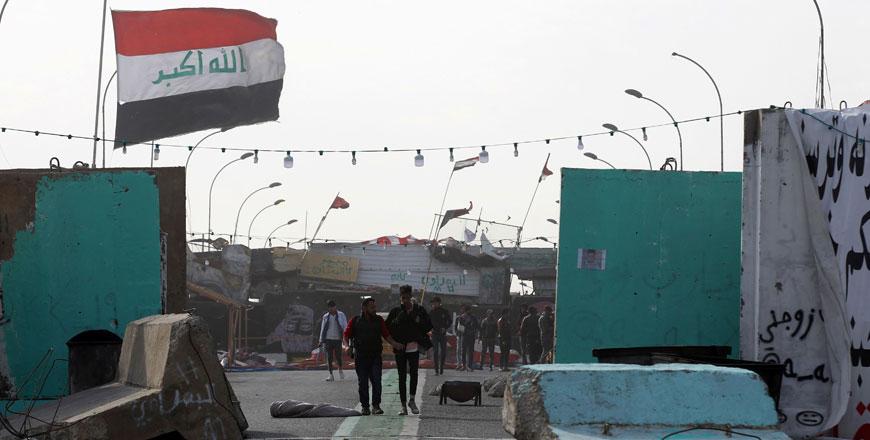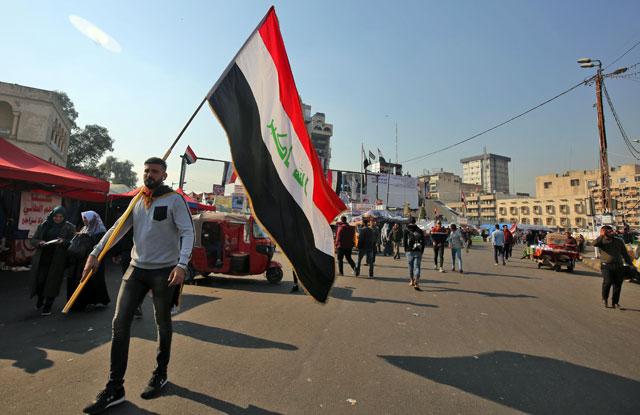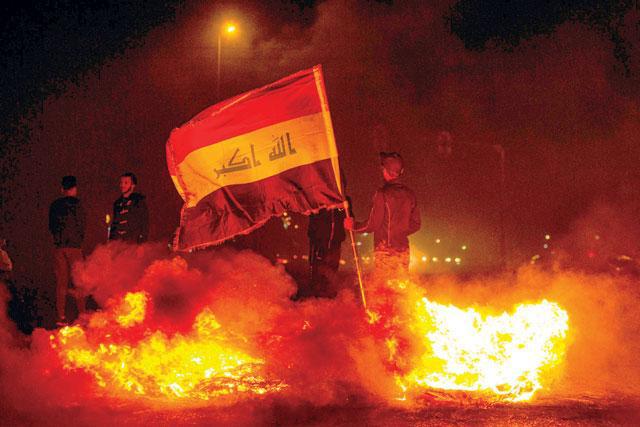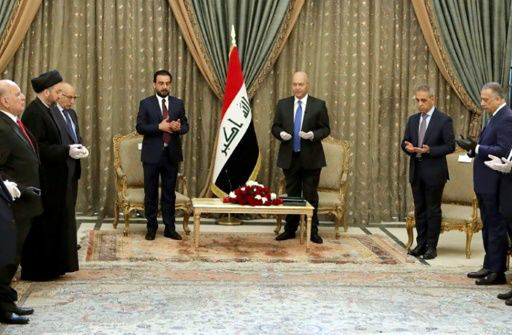You are here
Treason or civic-minded? Iraqis split on president’s threat to quit
By AFP - Dec 28,2019 - Last updated at Dec 28,2019

This photo taken on Wednesday shows a view of concrete barriers forming a barricade along Senak Bridge in the Iraqi capital Baghdad (AFP photo)
BAGHDAD — Iraqis were divided on Friday by their president’s threat to resign rather than accept a pro-Iran coalition’s candidate for premier, with some saying it was unconstitutional but others praising his civic-mindedness.
Barham Saleh has resisted recent attempts by a pro-Iran coalition to put forward nominees for prime minister that included a resigned minister and a controversial governor.
On Thursday, Saleh said he was “ready to resign” rather than accept a candidate already rejected by the protest movement that brought down the previous government.
Some 460 people have been killed and 25,000 injured since the unprecedented demonstrations broke out in October demanding deep reform that shows no sign of abating.
With the country plunged into crisis, some were hoping that the weekly sermon of influential Grand Ayatollah Ali Sistani would offer a way forward.
The 89-year-old is Iraq’s top Shiite cleric and his opinion has long been decisive in the country’s politics. But he remained silent on the political situation on Friday, further distancing himself from the ruling elite.
‘Thank you Barham’
In Baghdad’s Tahrir Square — the epicentre of the protest movement — a banner was unfurled overnight alongside portraits of rejected candidates for the premiership with their faces crossed out in red.
“Thank you Barham for siding with the demands of the people and rejecting the candidates of corrupt parties. We are with you,” it read.
But not all protesters shared this view.
“This resignation will lead to chaos and give the political parties even more control over the country,” said Ali Mohamed, a protesting teacher in Babylon province south of the capital.
“The president needs to stay to resist these parties, he is the only barrier in place to ensure that a nationalist candidate is nominated” for prime minister, he told AFP.
Further south in the protest encampment in Diwaniyah, Mohamed Mehdi said he hoped Saleh’s resignation would be accepted.
“That would lead to the dissolution of parliament. Then early elections could oust all these corrupt leaders,” he told AFP.
‘Into the unknown’
In the halls of power, reactions to Saleh’s gambit were equally divided.
The pro-Iran bloc that claims to be the largest in parliament — and should therefore be entitled to nominate the premier — called on lawmakers to “take legal action against the president for violating the constitution”.
But the list of ex-prime minister Haider Al Abadi, now in opposition, called on Saleh to “reconsider his resignation” and work with all towards a “radical change in the balance of power”.
Abadi’s list — which came third in the last elections but has since lost many of its lawmakers to the pro-Iran camp — said blocs must “abandon the mentality of treason, intimidation and domination” threatening to plunge Iraq “into the unknown”.
The pressure mounted by the pro-Iran camp is enormous, according to the Wataniya list of secular former premier Iyad Allawi.
The list applauded Saleh’s “civic position” but called on him to stay on to form a “reduced transition government” under United Nations supervision to lead Iraq “from this impasse”.
The deadlock is pitting the pro-Iran camp against determined protesters, who have shut down schools and public buildings across the south.
The civil disobedience will continue, protesters say, until they obtain what they have been demanding since October 1.
Protesters want a total overhaul of a patronage system that distributes posts according to sect and are calling for the resignation of a political elite that has remained unchanged for 16 years.
In their place, they hope fresh polls could elect experts unaffiliated with the political system installed by the United States after it led an invasion of Iraq in 2003 that toppled Saddam Hussein.
Since then Iran has wielded considerable influence in Iraq.
Many of these demands may be difficult to implement.
Parliament approved a new electoral system this week, replacing list voting with first-past-the-post, but experts suggest this will favour local notables over technocrats.
And so far, parties in power have been able to cooperate enough to maintain a patronage system that has seen Iraq rank globally among the most corrupt states.
By Salam Faraj
Related Articles
DIWANIYAH, Iraq — Thousands of protesters blocked roads and bridges across southern Iraq on Monday, condemning Iranian influence and politic
BAGHDAD — Iraq's president said Thursday he was "ready to resign" rather than put forward the candidate of a pro-Iranian coalition for the p
BAGHDAD — Iraqi President Barham Saleh nominated spy chief Mustafa Kadhemi on Thursday as the country's third prime minister-designate this



















